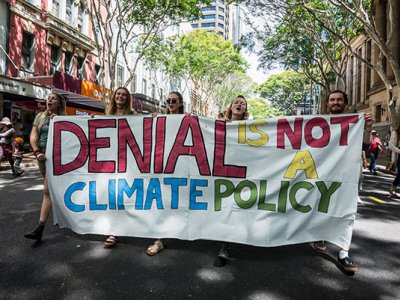 The widely held belief that people with conservative political views are more likely to reject climate change science has been challenged by University of Queensland researchers.
The widely held belief that people with conservative political views are more likely to reject climate change science has been challenged by University of Queensland researchers.
Professor Matthew Hornsey and colleagues from UQ’s School of Psychology and School of Communication and Arts surveyed 5323 people across 25 countries to analyse the link between climate scepticism and political conservatism.
“I was intrigued why, of the 17 candidates who campaigned to be the Republican nominee for the 2016 United States presidential campaign, many were openly sceptical of climate science,” Professor Hornsey said.
“This mainstream rejection of climate science among a major political party was not evident in other countries, which raised the question: is the tendency for conservatives to be more climate sceptical a global phenomenon, or something that’s distinctively American?
“We found that in approximately 75 per cent of the countries surveyed, conservatives didn’t show any more scepticism of climate change than other people.
“Interestingly, countries with relatively low levels of carbon emissions showed no relationship between conservatism and climate scepticism, whereas countries with high levels of emissions– including America and Australia – showed a stronger link.
“One possible reason is that conservatives in countries with high carbon emissions have more of a vested interest in rejecting climate science, due to the fossil fuel industry’s investment in that country.”
In addition to asking about political ideology, participants were asked about their belief in conspiracy theories.
“The inspiration for this question was Donald Trump’s tweet saying that climate science was a hoax created by the Chinese to make US manufacturing uncompetitive,” Professor Hornsey said.
Participants were asked to what extent they believed four famous conspiracies: that President John F. Kennedy was killed as part of an organised plot; that Princess Diana was murdered; that there was a group of elites conspiring to create a New World Order; and that the US government knew about the 9/11 terrorist attacks in advance and let them happen.
“We found that the more Americans believed conspiracies generally, the more they also thought that climate change was a hoax.
“This relationship was not found in the vast majority of countries.”
Professor Hornsey said the climate change views of non-American participants were not strongly linked with conspiratorial thinking, or their politics.
“This suggests that ideological barriers to accepting science don’t emerge from people spontaneously critiquing scientific consensus through the lens of their world views.
“Rather, ideological barriers to accepting science can also be encouraged by influential individuals and organisations who have a vested interest in communicating that the science is wrong.
“These results are encouraging for climate change mitigation efforts globally.”
Published in Nature Climate Change, the study was a collaboration between Professor Hornsey and PhD student Emily Harris from UQ’s School of Psychology, and Associate Professor Kelly Fielding from UQ’s School of Communication and Arts.



